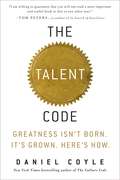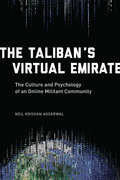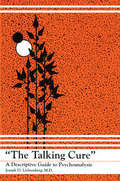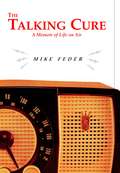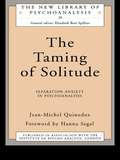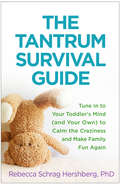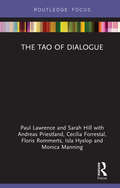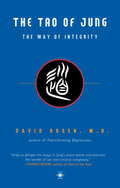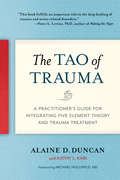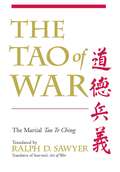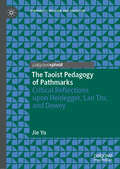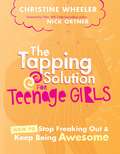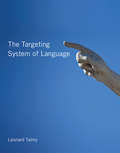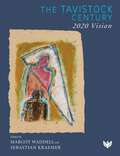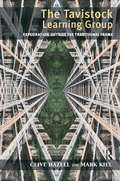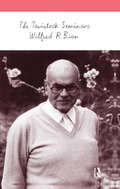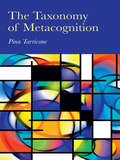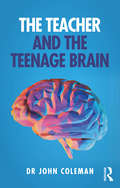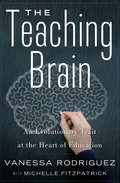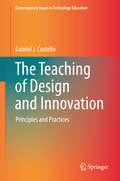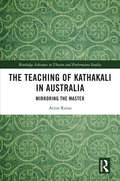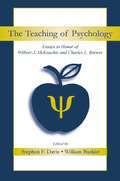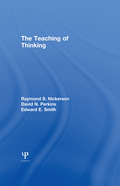- Table View
- List View
The Talent Code: Greatness Isn't Born. It's Grown. Here's How.
by Daniel Coyle'Talent. You've either got it or you haven't. ' Not true, actually. In The Talent Code, award-winning journalist Daniel Coyle draws on cutting-edge research to reveal that, far from being some abstract mystical power fixed at birth, ability really can be created and nurtured. In the process, he considers talent at work in venues as diverse as a music school in Dallas and a tennis academy near Moscow, to demostrate how the wiring of our brains can be transformed by the way we approach particular tasks. He explains what is really going on when apparently unremarkable people suddenly make a major leap forward. He reveals why some teaching methods are so much more effective than others. Above all, he shows how all of us can achieve our full potential if we set about training our brains in the right way.
The Taliban's Virtual Emirate: The Culture and Psychology of an Online Militant Community
by Neil Krishan AggarwalApplying cutting-edge psychiatric theories to an analysis of online Taliban literature in four languages, Neil Krishan Aggarwal constructs a game-changing narrative of the organization's broad appeal and worldview.Aggarwal, a cultural psychiatrist, focuses on the Taliban's creation of culture, evoking religion in Arabic and English writings, nationalism in Dari sources, and regionalism in Urdu texts. The group also promotes a specific form of argumentation, citing religious scriptures in Arabic works, canonical poets in Dari and Urdu writings, and scholars and journalists in English publications. Aggarwal shows how the Taliban categorize all Muslims as members and all non-Muslims as outsiders; how they convince Muslims of the need for violence; and how they apply the insider/outsider dichotomy to foreign policy. By understanding these themes, Aggarwal argues, we can craft better countermessaging strategies.
The Talking Cure: A Descriptive Guide to Psychoanalysis
by Joseph D. LichtenbergAmong the many elementary expositions of psychoanalysis, "The Talking Cure" is unique in focusing on the actual analytic experience. Lichtenberg's approach is humanistic, demonstrating empathic understanding of the fears and hopes of the person seeking help. He provides a "feel" for what happens during the analytic voyage of self-discovery.
The Talking Cure: A Memoir of Life on Air
by Mike FederAs a kid growing up in Queens, Mike Feder identified with Scheherazade of The Thousand and One Nights: "The idea of someone having to tell a new tale every night to prevent their head getting chopped off seemed sadly familiar to me." Back then, the author's audience was his mentally ill mother, who used to stay in the house all day with the shades drawn, and then insist that her son tell her stories so that she might vicariously experience the world outside. Eventually she committed suicide, and Feder grew up to be a relentless, comic storyteller on the radio. The Talking Cure tells the story of his ridiculous jobs, first failed marriage, the string of psychiatrists, and the misery of reluctant fatherhood; throughout he maintains a kind of bizarre balancing act--hilariousness and deep seriousness, conventionality and strangeness. An ironist and a comic, Feder looks unflinchingly at his own foibles and frailties, enabling him to connect to other people's stories. The reader emerges from this book with a sense of forgiveness for the human condition, and awe at the mystery of human life. Deeply funny, and at the same time breathtakingly dark, this is a book to provoke, amuse and, in some strange way, reassure: God loves a challenge.
The Taming of Solitude: Separation Anxiety in Psychoanalysis (The New Library of Psychoanalysis #Vol. 20)
by Jean-Michel QuinodozWinner of the 2010 Sigourney Award! Psychoanalysts would argue that at the root of anxiety about loneliness, which commonly brings people into analysis, lies anxiety about separation, unresolved since childhood. When re-experienced in analysis, the painful awareness of solitude - the sense of being a separate person - can become a rich source of personal creativity. In The Taming of Solitude, Jean-Michel Quinodoz brings together the views of Freud, Klein, Hanna Segal, W.R.D. Fairbairn, D.W. Winnicott, Anna Freud, Margaret Mahler, Heinz Kohut, John Bowlby and others, presenting a comprehensive approach to the experience of loneliness, a universal phenomenon which can be observed in everyday life and in any therapeutic situation. Written with clarity and insight, The Taming of Solitude will be of great interest to all psychoanalysts and therapists.
The Tantrum Survival Guide: Tune In to Your Toddler's Mind (and Your Own) to Calm the Craziness and Make Family Fun Again
by Daniel J. Siegel Rebecca Schrag HershbergIf you are the parent of a toddler or preschooler, chances are you know a thing or two about tantrums. While those epic meltdowns can certainly be part of "normal" toddler behavior, they are still maddening, stressful, and exhausting--for everyone involved. What can you do to keep your cool and help your child calm down? Rebecca Schrag Hershberg, child psychologist and mother of two, has a unique understanding of both the science behind tantrums and what works in the heat of the moment to nip blowups in the bud. With her customizable plan, you'll learn: *Why your toddler's developing brain is hardwired for "big emotions." *What you may be doing (unintentionally) to encourage outbursts. *Ways to use structure and routines to help your child feel secure. *How to reduce tantrums at tough times of day, from wake-up to bedtime. *Strategies for managing tantrums under difficult circumstances, from travel to moving to divorce. *Ways to deepen your parent–child connection--starting right now.
The Tao of Dialogue (Routledge Focus on Mental Health)
by Paul Lawrence Sarah Hill Andreas Priestland Cecilia Forrestal Floris Rommerts Isla Hyslop Monica ManningContemporary writers position ‘dialogue’ at the heart of change theory, but what do we mean by ‘dialogue’? The Tao of Dialogue explains through story what dialogue means, and how to leverage dialogic principles in managing relationships within the workplace. Accessible and innovative, The Tao of Dialogue explains the basic principles of dialogue, defined as a way of thinking and reflecting together with others, through the story of Michael, the CEO of a company about to embark on a life-changing journey. In the first half of the book, he is introduced to the idea of dialogue by Hannah, an internal change practitioner working within the organisation. He is encouraged to engage in dialogue with those he seeks to influence, which requires him to examine his mindset and proactively make changes to the ways in which he is communicating with his team and the wider organisation. In the second half of the book Michael is assisted by Mark, an external consultant with expertise in dialogic team and organisational development, who helps him apply dialogic principles to leading his team. Engaging yet practical, each part concludes with a summary of the dialogue that has taken place and how the model can be used in the real world, as well as an overview of the journey of the organisation, team and individuals. Emerging from dialogue between seven experienced, international coaches, The Tao of Dialogue will be of interest to coaches in practice and training, as well as business leaders, HR and L&D professionals and consultants. It explains in simple terms how to transform human relationships, both one-to-one and team/group. It will also appeal to academics and students of coaching, executive development, change management and leadership development.
The Tao of Jung: The Way of Integrity
by David H. RosenThis startling new interpretation of Jung's life and psychology is based on the insight that he was essentially a Taoist. Drawing on Jung's own letters, aphorisms, and other writings, David Rosen examines six crises in Jung's personal development, from childhood revelations and youthful rebellions to his break with Freud and his later work with the I Ching. Rosen discovers many parallels between Jung's natural world of the psyche and that of Taoist philosophy: the integration of opposites; the Great Mother as the origin of all things; the I Ching and synchronicity; the Way of Integrity and individuation; and the need to release the ego and surrender to the Self or Tao. As an increasing number of people turn to Eastern philosophy as a means of handling the many stresses of an increasingly confounding world, this illuminating introduction to both Taoism and Jungian thought provides a valuable spiritual resource for contemporary followers of the Path. .
The Tao of Jung: The Way of Integrity
by David H. RosenThis startling new interpretation of Jung's life and psychology is based on the insight that he was essentially a Taoist. Drawing on Jung's own letters, aphorisms, and other writings, David Rosen examines six crises in Jung's personal development, from childhood revelations and youthful rebellions to his break with Freud and his later work with the I Ching. Rosen discovers many parallels between Jung's natural world of the psyche and that of Taoist philosophy: the integration of opposites; the Great Mother as the origin of all things; the I Ching and synchronicity; the Way of Integrity and individuation; and the need to release the ego and surrender to the Self or Tao.As an increasing number of people turn to Eastern philosophy as a means of handling the many stresses of an increasingly confounding world, this illuminating introduction to both Taoism and Jungian thought provides a valuable spiritual resource for contemporary followers of the Path.
The Tao of Trauma: A Practitioner's Guide for Integrating Five Element Theory and Trauma Treatment
by Kathy L. Kain Alaine D. Duncan M.D. Hollifield MichaelExplains trauma using a combination of the Five Elements (from Traditional Chinese Medicine) and a touch perspective; for practitioners of a variety of modalities, including acupuncturists, somatic therapists, massage therapists, and mental health providers.Combining Eastern and Western trauma physiology, clinician-educators Alaine Duncan and Kathy Kain introduce a new map for acupuncturists, medical practitioners, mental health providers, and body-oriented clinicians to help restore balance in their patients. Using concepts from Acupuncture and Asian Medicine (AAM), alongside descriptions of the threat response from Western bio-behavioral science, they describe common physical symptoms, emotional presentations, and paths for healing for five survivor "types" detailed by the authors and correlated to the Five Elements of AAM. This ancient/modern integrative lens illuminates the diverse manifestations of traumatic stress in its survivors--chronic pain, autoimmune illness, insomnia, metabolic problems, and mental health disorders--and brings new hope to survivors of trauma and those who treat them.
The Tao of War
by Ralph D. SawyerWang Chen, a ninth-century military commander, was sickened by the carnage that had plagued the glorious T'ang dynasty for decades. "All within the seas were poisoned," he wrote, "and pain and disaster was rife throughout the land. " Wang Chen wondered, how can we end conflicts before they begin? How can we explain and understand the dynamics of conflict? For the answer he turned to a remarkable source-the Tao Te Ching. Here is Wang Chen's own rendering of and commentary on the ancient text, insightfully expanded and amplified by translator Ralph D. Sawyer, a leading scholar of Chinese military history. Although the Tao long influenced Chinese military doctrine, Wang Chen's interpretations produced the first reading of it as a martial text-a "tao of war. " Like Sun-tzu's Art of War, certainly the most famous study of strategy ever written, the Tao provides lessons for the struggles of contemporary life. In the way that the ancient Art of War provides inspiration and advice on how to succeed in competitive situations of all kinds, even in today's world, Wang Chen's The Tao of War uncovers action plans for managing conflict and promoting peace. A book to put on the shelf next to Art of War, Wang Chen's The Tao of War is a reference of equally compelling and practical advice.
The Taoist Pedagogy of Pathmarks: Critical Reflections Upon Heidegger, Lao Tzu, And Dewey (Spirituality, Religion, and Education)
by Jie YuBased on the intertwined complex conversations among Heidegger, Dewey, and Lao Tzu, this book explores the possibilities of the Taoist Pedagogy of Pathmarks as a clearing between truth and untruth, responding to the spiritual call of Tao as inaction and teaching as releasement. In this book, Yu provides a critical exploration of the rich dynamics in the “direct” conversations among the three great thinkers of east and west, highlighting the implications of their ideas for education throughout. As more educational researchers, teacher educators, and teachers recognize the limitations of didactic teaching-as-telling, the author brings an alternate pathway to light.
The Tapping Solution for Teenage Girls: How to Stop Freaking Out and Keep Being Awesome
by Christine WheelerIn this book, Christine Wheeler tells teenage girls about some super easy relaxation techniques they can do by themselves to help them stop freaking out about stuff that's happening in their life and get back to being their awesome self.
The Targeting System of Language (The\mit Press Ser.)
by Leonard TalmyA proposal that a single linguistic/cognitive system, “targeting,” underlies two domains of reference, anaphora (speech-internal) and deixis (speech-external).In this book, Leonard Talmy proposes that a single linguistic/cognitive system, targeting, underlies two domains of linguistic reference, those termed anaphora (for a referent that is an element of the current discourse) and deixis (for a referent outside the discourse and in the spatiotemporal surroundings). Talmy argues that language engages the same cognitive system to single out referents whether they are speech-internal or speech-external.Talmy explains the targeting system in this way: as a speaker communicates with a hearer, her attention is on an object to which she wishes to refer; this is her target. To get the hearer's attention on it as well, she uses a trigger—a word such as this, that, here, there, or now. The trigger initiates a three-stage process in the hearer: he seeks cues of ten distinct categories; uses these cues to determine the target; and then maps the concept of the target gleaned from the cues back onto the trigger to integrate it into the speaker's sentence, achieving comprehension. The whole interaction, Talmy explains, rests on a coordination of the speaker's and hearer's cognitive processing. The process is the same whether the referent is anaphoric or deictic.Talmy presents and analyzes the ten categories of cues, and examines sequences in targeting, including the steps by which interaction leads to joint attention. A glossary defines the new terms in the argument.
The Tavistock Century: 2020 Vision
by Margot Waddell and Sebastian KraemerGathering together an incredible array of contributors from the past century of the Tavistock to cover all aspects of amazing work they do. With chapters from David Armstrong, James Astor, Andrew Balfour, Fred Balfour, Sara Barratt, David Bell, Sandy Bourne, Wesley Carr, Andrew Cooper, Gwyn Daniel, Dilys Daws, Domenico di Ceglie, Emilia Dowling, Andrew Elder, Caroline Garland, Peter Griffiths, Rob Hale, Sarah Helps, Beth Holgate, Juliet Hopkins, Marcus Johns, Sebastian Kraemer, James Krantz, Mary Lindsay, Julian Lousada, Louise Lyon, David Malan, Gillian Miles, Lisa Miller, Mary Morgan, Nell Nicholson, Anton Obholzer, Paul Pengelly, Maria Rhode, Margaret Rustin, Michael Rustin, Edward R. Shapiro, Valerie Sinason, Jenny Sprince, John Steiner, Jon Stokes, David Taylor, Judith Trowell, Margot Waddell, and Gianna Williams The Tavistock Century traces the developmental path taken from the birth of a progressive and inspirational institution. From their wartime and post-war experience, John Rickman, Wilfred Bion, Eric Trist, Isabel Menzies, John Bowlby, Esther Bick, Michael Balint, and James Robertson left us a legacy of innovation based on intimate observation of human relatedness. The book contains entries across the full range of disciplines in the lifecycle, extending, for example, from research to group relations, babies, adolescents, couples, even pantomime. It will be of enormous value to anyone working in the helping professions; clinicians, social workers, health visitors, GPs, teachers, as well as social science scholars and a host of others who are directly or indirectly in touch with the Tavistock wellspring.
The Tavistock Learning Group: Exploration Outside the Traditional Frame
by Clive HazellIn The Tavistock Learning Group: Exploration Outside the Traditional Frame, the authors attempt to expand the heuristic, theoretical, and applied dimensions of Group Relations paradigms by pairing classical Group Relations concepts with typically non-Tavistock psychology paradigms and social sciences concepts. Under the broad domain of psychologically-informed constructs, Lacanian psychoanalysis, existential philosophy and bioenergetics are applied. Under a somewhat broader range of social science conceptualization, the capacity for abstraction is linked with anti-work in groups, the large group is re-imagined as an extension of community dynamics and dysfunction, and the role of symbol systems, symbology and semiotics are examined in relation to sophisticated work groups. Lastly, non-Tavistock models of group development and conceptualization are re-interpreted and explained using a group-as-a-whole framework.
The Tavistock Model: Collected Papers of Martha Harris and Esther Bick
by Martha Harris Esther BickThis is one of a new two volume edition of Collected Papers of Martha Harris and Esther Bick, which includes some papers not published in the first edition. The companion volume, Adolescence, by Martha Harris and Donald Meltzer, contains those papers by Martha Harris specifically related to adolescence.
The Tavistock Seminars
by Wilfred R. BionPreviously unpublished lectures from Wilfred Ruprecht Bion. The book consists of eight talks Bion gave at the Tavistock Clinic between 1976 and 1979. Topics explored include the importance of observation; dreams; art and psychoanalysis; and the significance of time in psychoanalysis. In addition, this volume includes an illuminating interview of Bion by Anthony G. Banet in 1976.'In your practice you will find yourself under pressure. You say whatever you have to say, and then there is an entirely new situation. You don't really know what is going on because it is an entirely new situation, things will not be the same. It is likely enough that the patient will say, "Why don't you say something?" Or if not the patient, the relatives - "Why don't you do something?" So you are always under pressure prematurely and precociously to produce your idea. Poor little thing! Pull it up by the roots and have a look at it - it hasn't got a chance. So you have to act as a sort of parent to the idea - protect it and give it a chance to grow in spite of these pressures; you have to be able to tolerate this state of ignorance.'- W.R. Bion
The Taxonomy of Metacognition
by Pina TarriconeMetacognition is a complex construct which is fundamental to learning. Its complex, fuzzy and multifaceted nature has often led to its colloquial application in research, resulting in studies that fail to identify its theoretical foundation or elements. In response to this, the research community continues to call for a comprehensive understanding of the construct of metacognition. This book is a response to this call for clarity. Pina Tarricone provides a theoretical study of the construct of metacognition in terms of psychological theory. The first part of the book analyses the relationship between reflection and metacognition, and the second part goes on to analyse the construct of metamemory as the foundation of metacognition. The third and final part of the book analyses the construct of metacognition to present the final conceptual framework of metacognition and the taxonomy of metacognition. This framework builds a picture and a nexus of the construct through visual links to the related concepts that contribute to what is known as metacognition. The Taxonomy of Metacognition provides a comprehensive representation and categorisation of all of the terms, concepts, categories, supercategories, subcategories and elements of metacognition. It clarifies the construct so that researchers and teachers can develop a better understanding of it. This important and broad ranging contribution can be applied to many related areas, by researchers, psychologists, teachers and any profession interested in psychological learning processes.
The Teacher and the Teenage Brain
by John ColemanThe Teacher and the Teenage Brain is essential reading for all teachers and students of education. This book offers a fascinating introduction to teenage brain development and shows how this knowledge has changed the way we understand young people. It provides a critical insight into strategies for improving relationships in the classroom and helping both adults and teenagers cope better with this stage of life. Dr John Coleman shows how teachers and students can contribute to healthy brain development. The book includes information about memory and learning, as well as guidance on motivation and the management of stress. Underpinned by his extensive work with schools, Dr Coleman offers advice on key topics including the importance of sleep, the social brain, moodiness, risk and risk-taking and the role of hormones. This book is extensively illustrated with examples from classrooms and interviews with teachers. It explicitly links research and practice to create a comprehensive, accessible guide to new knowledge about teenage brain development and its importance for education. Accompanied by a website providing resources for running workshops with teachers and parents, as well as an outline of a lesson plan for students, The Teacher and the Teenage Brain offers an innovative approach to the understanding of the teenage brain. This book represents an important contribution to teacher training and to the enhancement of learning in the classroom.
The Teaching Brain: An Evolutionary Trait at the Heart of Education
by Vanessa Rodriguez Michelle Fitzpatrick&“A significant contribution to understanding the interaction among teachers, students, the environment, and the content of learning&” (Herbert Kohl, education advocate and author). What is at work in the mind of a five-year-old explaining the game of tag to a new friend? What is going on in the head of a thirty-five-year-old parent showing a first-grader how to button a coat? And what exactly is happening in the brain of a sixty-five-year-old professor discussing statistics with a room full of graduate students? While research about the nature and science of learning abounds, shockingly few insights into how and why humans teach have emerged—until now. Countering the dated yet widely held presumption that teaching is simply the transfer of knowledge from one person to another, The Teaching Brain weaves together scientific research and real-life examples to show that teaching is a dynamic interaction and an evolutionary cognitive skill that develops from birth to adulthood. With engaging, accessible prose, Harvard researcher Vanessa Rodriguez reveals what it actually takes to become an expert teacher. At a time when all sides of the teaching debate tirelessly seek to define good teaching—or even how to build a better teacher—The Teaching Brain upends the misguided premises for how we measure the success of teachers. &“A thoughtful analysis of current educational paradigms . . . Rodriguez&’s case for altering pedagogy to match the fluctuating dynamic forces in the classroom is both convincing and steeped in common sense.&” —Publishers Weekly
The Teaching of Design and Innovation: Principles and Practices (Contemporary Issues in Technology Education)
by Gabriel J. CostelloThis book is about design and innovation – what it is and how to teach it. The blending of design and innovation is having an increasing impact not only on the world of products and services but on a wide variety of disciplines such as information and communications technology (ICT), business, education and medicine. However, there is a lack of books on teaching the subject despite the significant growth of interest in both academia and the workplace. This book addresses this gap by outlining foundational principles for the teaching of design and innovation and by offering a practical process for implementing the pedagogy in academic institutions and outside academia in the context of continuing professional development (CPD). It describes two undergraduate case-studies that aimed to instill design and innovation competences in students of both engineering and business disciplines. The cases involved student teams working with incubation centre start-ups and multi-national subsidiaries. One of the aims of this book is to provide a resource for continuing professional development (CPD). Consequently, a third practitioner-based case study is presented as an example of research-informed teaching. In addition, the book proposes the concept of Simulation-Action Learning (SAL) as an enhancement of Project-Based Learning (PBL).
The Teaching of Kathakali in Australia: Mirroring the Master (Routledge Advances in Theatre & Performance Studies)
by Arjun RainaThis book tells the story of teaching Kathakali, a seventeenth century Indian dance-drama, to contemporary performers in Australia. A rigorous analysis and detailed documentation of the teaching of multiple learners in Melbourne, both in the group workshop mode and one-on-one, combined with the author’s ethnographic research in India, leads to a unique insight into what the author argues persuasively is at the heart of the art’s aesthetic- a practical realisation of the theory of rasa as first articulated in the ancient Sanskrit treatise on drama The Natyashastra. The research references the latest discoveries in neuroscience on ‘mirror neurons’ and argues for a reconceptualization of Kathakali’s imitative methodology, advancing it from the reductive category of ‘mimicry’ to a more contemporary and complex mirroring which is where its value lies in Australian actor performer training. The Teaching of Kathakali in Australia will be of great interest to students and scholars of theatre and dance, intercultural actor training, practice-led research, and interdisciplinary studies of neuroscience and performance.
The Teaching of Psychology: Essays in Honor of Wilbert J. McKeachie and Charles L. Brewer
by Stephen F. Davis William BuskistThe Teaching of Psychology is centered around the masterful work of two champions of the teaching of psychology, Wilbert J. McKeachie and Charles L. Brewer, in order to recognize their seminal contributions to the teaching of the discipline. The book's main goal is to provide comprehensive coverage and analysis of the basic philosophies, current issues, and the basic skills related to effective teaching in psychology. It transcends the typical "nuts and bolts" type books and includes such topics as teaching at small colleges versus a major university, teaching and course portfolios, the scholarship of teaching, what to expect early in a teaching career, and lifelong learning.The Teaching of Psychology also features: Biographies of Bill McKeachie and Charles L. Brewer Fourteen chapters written by leading authorities in the teaching of psychology, which provide overviews of the latest psychological research and theories in effective college and university teaching. These chapters cover lecturing, classroom presence, using humor in teaching, pedagogy, advising, teaching critical thinking, writing, and technology, and training graduate students to teach Useful advice to new teachers and seasoned veterans, including qualities of master teachers, understanding the many facets of working within the academy, and teaching with technology Insights into teaching specific courses within the psychology curriculum, including the history of psychology, biological psychology, statistics and research methods, learning, social psychology, personality, psychology of women, cross-cultural psychology, industrial/organizational psychology, psychology of religion, and environmental psychology A closing section containing Bill McKeachie's and Charles L. Brewer's perspectives into the teaching of psychology and its history, highlights, and future. This book is intended for academic psychologists who teach and/or train graduate assistants to teach at the college and university level. All royalities from this book will be donated to the Society for the Teaching of Psychology (Division 2 of the American Psychological Association), which each year sponsors many activities across the country to promote the teaching of psychology.
The Teaching of Thinking
by D. N. Perkins R. S. Nickerson E. E. SmithFirst published in 1985. This book was created due to involvement of the authors to develop a course to enhance thinking skills. A main aim of which was to determine what is known about the teaching of thinking from current research literature and from the results of efforts to develop cognitive enhancement programs. The primary focus is on intentional, purposeful, goal-oriented thinking-thinking, if you will, for the express purpose of realizing some specific objective.
